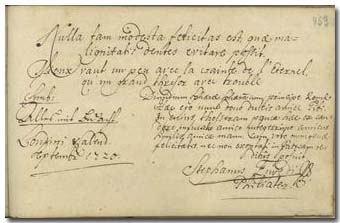
Nulla tam modesta felicitas est, quae malignitatis dentes evitare
possit. * Mieux vaut un peu avec la
crainte de l’Eternel, qu’un grand thresor avec trouble.
Dimidium Sphaerae, Sphaeram cum principe
Romae
Haec ego nunc dono dulcis amice Tibi.
In cujus thesseram pauca haec ex candore
infucato amico integerrimo amicus similis amica manu. Cum voto
omnigenae felicitatis, nec non exoptati in Patriam reditûs posuit
Stephanus Enyedi mp.
Philiater Symb[olum]
Alles mit Bedacht. Londini 8.
Calend. septembr. 1720.
|
* Valerius Maximus,
Facta et dicta memorabilia 4.7ext.2.
|
|
|
There is no such modest felicity that could avoid the teeth of
pravity.
*
The few in the fear of the Eternel is more
valuable than a great treasure with tribulations.
The half of the orb, and the whole orb with
the Roman Emperor, / This is what I donate to you now, my sweet
friend.
To whom I write this trifle as a
memento from all my heart, as a true friend to my true friend with
a truely friendly hand; and to whom I wish all the best, and a
fortunate and most desired return to our fatherland
István Enyedi
“friend of the science of medicine”
Motto: Everything with circumspection.
In London, the eighth day before the calends
of September 1720.
|
p.
453. London, August 25, 1720
Enyedi István
(1694-?), Transylvanian physician
István
Enyedi was born in 1694 in Nagyenyed (Aiud), where his father,
István Enyedi Sen. (1659-1714) was a professor of theology; his
mother was Sára Halmágyi. The son went to upper classes
(subscribed) in Enyed in 1709. In 1716 he studied in Frankfurt an
der Oder, and from 1717 in Halle; here he graduated in medicine on
August 28, 1719. On November 8 he immatriculated at the university
of Leiden. He also visited Dresden and Leipzig, then Rotterdam,
France and England. In 1721 he returned to Kolozsvár (Cluj) where
he practised medicine. He became Senator, then Chief Judge. His
work is: Dissertatio medica de
medicina Hippocratis mechanica, praeside Friderico Hoffmanno.
Halle, 1719.
The peregrinations of István Enyedi and of many other
Transylvanian students are well described in the letters sent by
him to his supporter Count Sándor Teleki. He met Ferenc Pápai
Páriz both in Leiden and London [Peregrinus 172, 174]; he wrote in
the album in London, on August 25, 1720. The chairman of his
examination in Halle was Friedrich Hoffmann (1660-1742), whose
colleague Georg Ernst Stahl, and a student of both, Georg Sigmund Liebezeit
from Sopron also wrote in the album (pp. 179,
351). Enyedi signs his memento as “Philiater”.
No other occurrences of this term have been found so far. This
compound contains the Greek roots philein = love or philos =
friend, and iatros = physician (cf. 'psychiater',
'archiater' = court physician, 'iatrochemistry' (iatrochemia)). A
voyager for example refers to Liebezeit as 'poliater' [Szála 40] =
town physician. Iatrochemistry was a medical doctrine represented
by the 17th-c. Leiden professor Franciscus Sylvius (de la Boe),
who stated that symptoms of life are caused by bodily fluids; it
was opposed by 'iatrophysics' that emphasized the role of solid
components and mechanical interactions. Judged on the basis of its
title, the dissertation of Enyedi also belonged to this trend. –
The German motto: Alles mit Bedacht
(Expende – Expende primo – Consider it before) was often written
on coins and in albums.
•
AlbLeid 865 • Graaf • Jakó-Juhász 126 • Peregrinus • Rettegi-Jakó
510 • Szabó-Szögi 153 • Szinnyei • Weszprémi III 304, 356 |

